2 May 2018
News
Notes from the Kick-Off Event of the HIAP & Mustarinda Collaboration: post-fossil transition
A couple of weeks ago, on Friday evening the 6th of April a group of nearly one hundred enthusiasts from various fields gathered in HIAP to discuss the post-fossil future in the kick-off event of the new 3-year companionship and learning process of HIAP & Mustarinda.
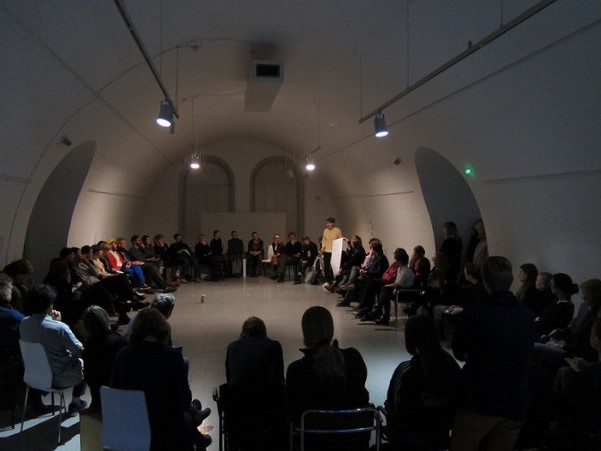
To introduce, Pauliina Leikas, Antti Majava and Paavo Järvensivu talked about activities, experiences and experiments in the context of Mustarinda. After that curator Jenni Nurmenniemi brought us to the main question of the evening “What can a cultural organization do to accelerate the transition to post-fossil culture?” by sharing some selected learnings from the Frontiers in Retreat project (http://www.frontiersinretreat.org/).
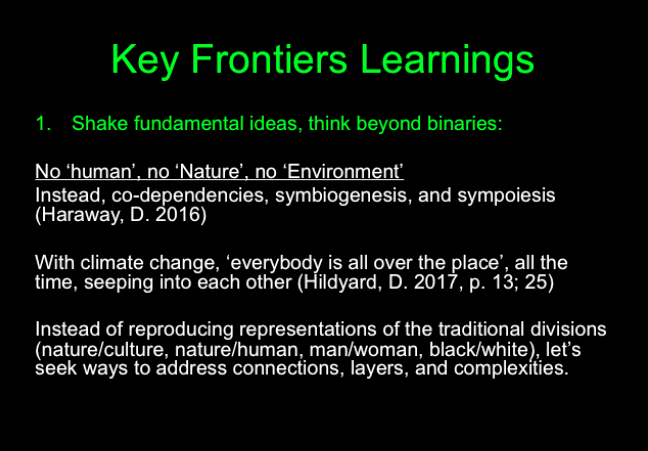
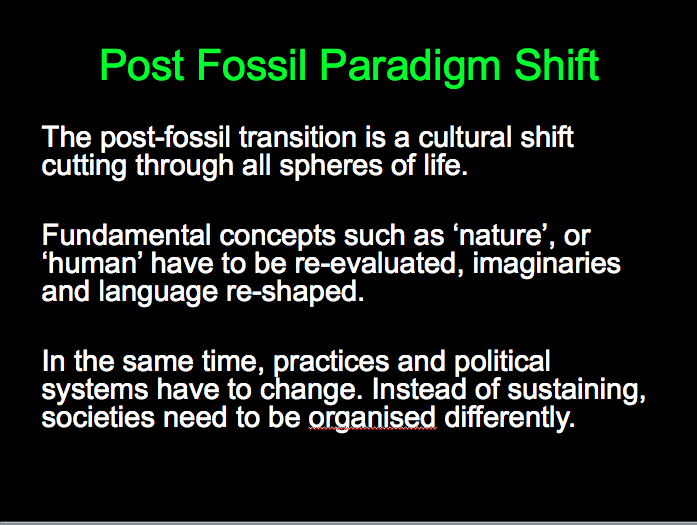
The project focused on the question how ecological discourses and contemporary art practices intersect and created a starting point for the HIAP & Mustarinda partnership which is now taken to the next level by challenging institutional and personal practices.
Following the presentations small groups were formed around the three main themes of the project: food, energy and transport. Passion, concentration and laughter filled the air. For the sharing session each group picked a few key points (ideas, examples, concerns) they wanted to emphasize. Different approaches, layers and dynamics were present. Shift in paradigm, time and social perspective stood out; questions piled up; more or less concrete solutions were proposed.
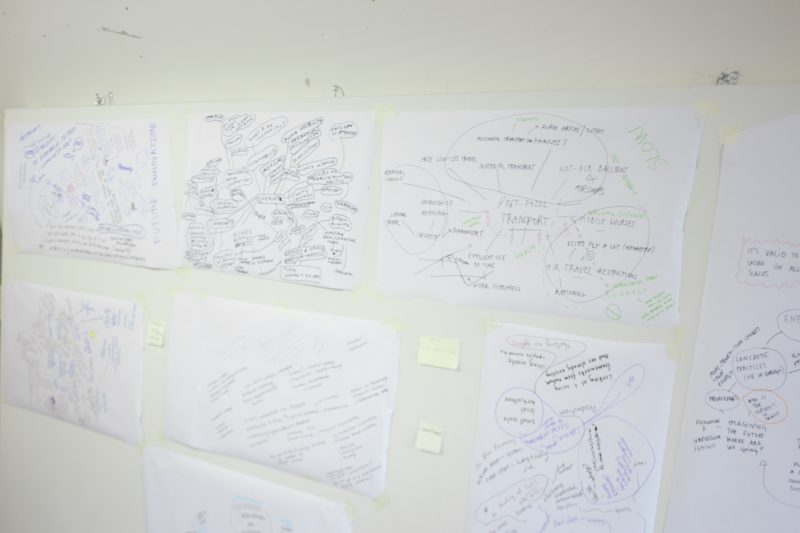
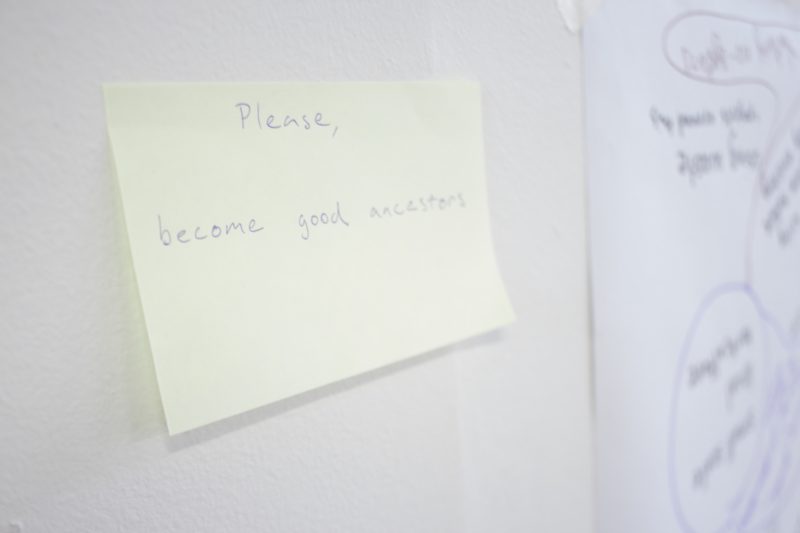
Group 1 (Transport)
1. Change in thinking (in general)
- your own personal way is met with how things are actually organized, life style change in your personal and work life
- If we measure things based on “time”, we need to do things fast (-> we e.g. fly more), time becomes a constrain
2. Change in practices
3. Practical means
- Optimizing current system
- Social perspective: who does all that flying; some people never fly, some people fly all the time
- A tunnel is the fastest way from one surface to another
- Free train travelling?
- Getting fulfilment through shamanistic practices and/or drugs so that we won’t need to get gratification from traveling to all these places that you can only reach by plane, far and exotic; what does that say about us?
Group 2 (Energy aka end the patriarchy)
1. Extinction
- Should we continue living/existing? What does sustainable mean? What are we sustaining? What are we trying to maintain?
2. God and energy and the spirit and the terminology of energy and evil
- Are we bad people and should we repent and receive mercy?
- What structural reasons have made us bad?
3. Time
- Greek time, 2 different kind of time: kronos and kairos – momentum time, different scales and measurements
- “We have to do something” and maybe we have the “means”.
- Connection between energy and time
- How does energy consumption relate to time, temporalities, being busy?
- Business of life, energy weather, capitalism
- Structural change needed ; inequality; not possible to decrease energy consumption
- How does energy consumption relate to time, temporalities, being busy?
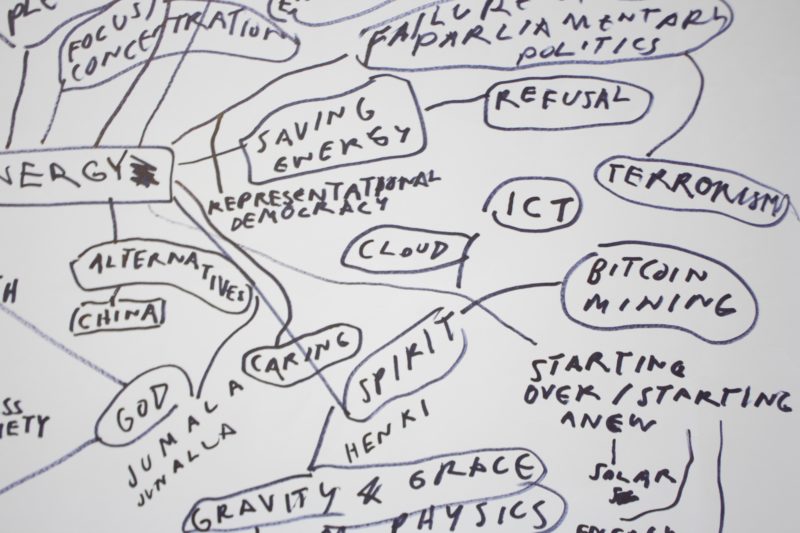
Group 3 (Food)
1. Urine and feces, how astronauts consume their own waste
2. Insect farming and its benefits
3. Farming, working with the prison
4. Guided bike tours to educate people about wild food (berries, mushrooms…)
5. Recipe cook books and cooking courses for wild veggies and insects in Mustarinda/HIAP
6. Fermentation of food during the winter; growing food in the studios/in dark spaces (cellars), sprouting
7. The front yard of HIAP transformed into a garden, residents taking care of
Group 4 (Energy)
1. Time and different temporalities
2. Complexifying the way we look at our environment, making things a bit more complicated; co-dependencies
3. Why-ing, or because-ing, asking why all the time, like children
4. We make this happen very fast, but we wanted to give a lot of time for things to happen in a non-hurried space.
- How to organize events and how to build slowness into projects and personal practice?
5. Time in organizations
- How to use time/disperse activities?
- Case specific thought about deadline or ‘deadlining culture’
- Clinging on to traditional forms of art work or performance; what is an art work?
- Coffee drinking as an accelerationist practice
- Project based funding, working structures and time structures; how to get rid of?
- How to come up with a terminology that disrupts the project-based lingo
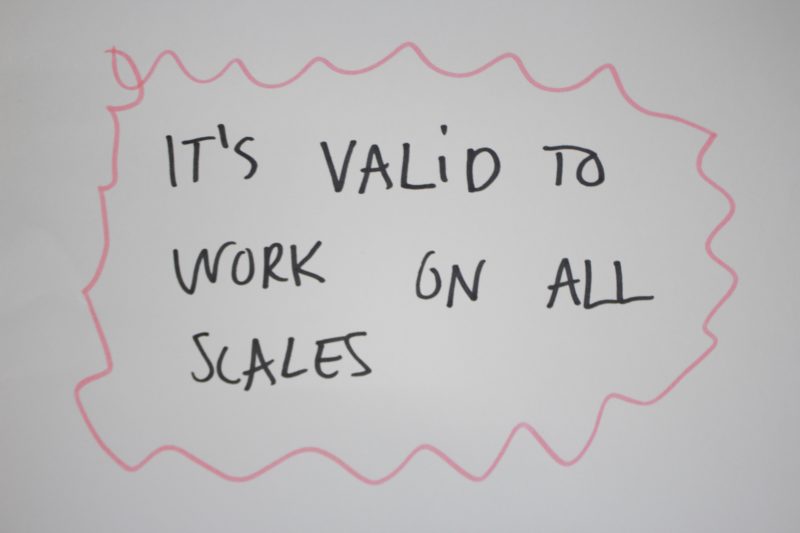
Group 5 (Energy)
1. The possibility of art institutions or actors gathering together and forming larger than oneself collective action to challenge or push larger institutions/actors dealing with energy e.g. politicians or energy companies (collective action)
- Individual choices are not the way: how to get to the structures? Can art institutions challenge other actors?
- Direct action with artistic ideas
- Identifying the players and making them visible
- Pushing for a more radical concept of sustainability (elasticity, cyclicity)
- More money=more choices=more energy
2. Valid and important to work on all scales (micro and macro) on all fronts and at all times
3. Possible futures
- Who is a subject, who is an object? (privileges)
- Who is left out, who is creating futures
- What are their bases and assumptions?
Group 6 (Energy)
1. “It’s about everything”, a holistic view
- All the shifts should take place in environmental terms
2. Decentralization and democratization of energy
- Selling energy to the network and producing your own should be the future
- Centralized system is just making a bunch of money
- Use geo-thermal heating
3. Shift in values, paradigmatic shift
- Definition of good life; e.g. sharing as a practice; to lower consumption, to increase happiness
- Depower from our actions would power our leisure (e.g. gym powering sauna)
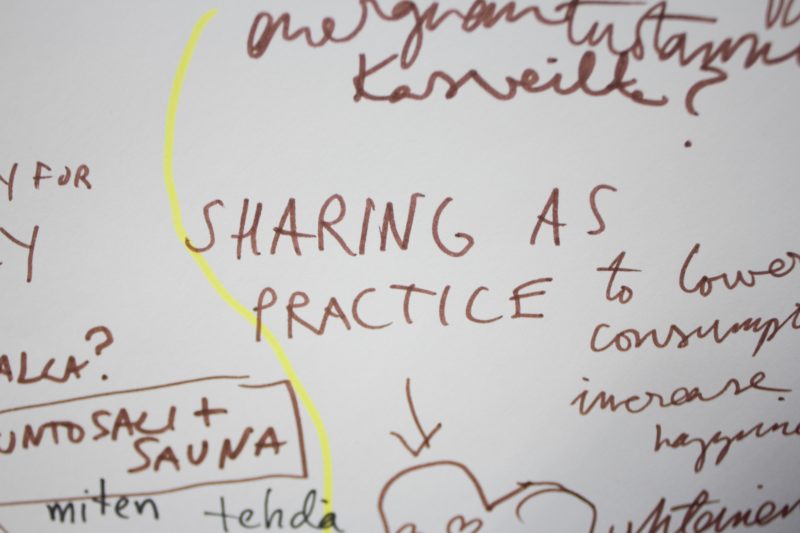
Group 7 (Transport)
1. Mindset; how to change from our present way of thinking to another
2. Bodily thinking (thinking through our body)
- What can you carry?
- How much energy we consume in our body
- How it might change the perception to find the natural rhythm of living and thinking, building and creating; does everything have to be quick and fast?
- How to create organic machine to transport us
3. Reducing consumption is the key to everything
4. Time and the structure of wanting to move all the time.
- We need to learn to enjoy the more local culture and transport and not only the ones on the other side of the globe; focusing transporting yourself to a small area
- The concept of locality; is local less valuable than international?
- Is virtual reality a solution?
5. Do we still want to have vehicles; weather as a force/power/source for movement
Group 8 (no theme)
1. Frustration related to attempts to bring forward ecological ‘ways of doing things’ in construction and real estate
- The clear power structure against these attempts and how it is often all male
- Differences for people who don’t own their own property and how to explain the financing and material and construction decision making process
- How to influence the people making decisions?
2. Waiting for some people to retire; stopping from changing the society
3. We can’t win the game by repeating business victories or the same old reasonings; we have too much good will and not enough readiness to do it among us, we have to get it done
Group 9 (Food)
1. Transition from industrial food to small scale food production
2. Urban environments and industrialization and the difficulties of small companies, labour, exhaustion, laws, gender and who ends up doing all the work
3. Thinking of soils and with soils, systems and ecosystems
- Nurturing ecosystems. not just exploitation
- Thinking about permaculture, caring
- How to cultivate healthy system for humans and others
- Not just function, also pleasure
4. Conservation and hunting and meat; livestock and the status of livestock
The goal of the event was as much to create and share tools for the post-fossil future as to come together, map out interests and connect kindred spirits. If you didn´t make it this time, don´t worry – there will be new ones. This spring is reserved for community building as well as the upcoming summer months. If you feel like becoming part of the project, let us know by e-mailing to postfossil@hiap.fi or pop in to share your ideas in person e.g. on the 22th of May when the Open Studios event takes place in HIAP. The first proper year of programme will be the year of 2019. In autumn 2018 there will be an open call for residencies related to the project. Stay tuned!
